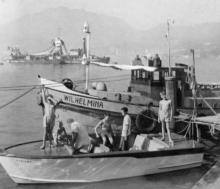30 Aug 1945, Chronology of Events Related to Stanley Civilian Internment Camp
Primary tabs
The sky was clear and clean. There was no wind - just the faintest dawn breeze. The sun was storming up out of the China Sea in a roar of colour.
It's the day the Colony's been waiting for since December 25, 1941, and, as it unfolds, the weather is perfect:
(A) brilliant sun is scorching its way across a blue sky dotted with white clouds. A breeze from the east makes it cool in the shade...
Early in the morning the internees spot Rear-Admiral Cecil Harcourt's fleet about 20 miles from Hong Kong. Larry Andrewes, former Supreme Court Registrar, makes an attempt to reach it in a Chinese fishing boat. He's picked up by a picket-boat that's on its way to Stanley to ask about conditions in Hong Kong, and taken aboard H. M. S. Maidstone. He tells Captain Shadwell that Gimson's already established a British administration in town. He then takes a bath and is given fresh clothes. He sends a huge sandwich loaf into Stanley - the recipients are moved to tears by the sight.
At 11 a.m. the Hong Kong Government issues its first communique since December 25, 1941:
Rear-Admiral Harcourt is lying outside Hong Kong with a very strong fleet...
At about noon Harcourt lands to repossess Hong Kong and assure the safety of the population. He is ready for trouble, but in fact, there is little resistance.
Rear-Admiral Harcourt's first official duty is to visit Stanley. At 5 p.m. a truck full of marines draws up in Camp followed by three cars:
The cheering was something you hear only once in your life - if you are lucky enough to hear it once.
Prisoner Officer William Hudson begins to write to his wife Peg and son Peter who had been evacuated to Australia:
My Darlings,
I don’t know how to start this letter, I have so much to say – and I want to say it all at once. Well my Sweethearts – thank the Lord we have pulled through successfully. I never for one moment thought we would lose the War, but I had a horrid feeling they would do something to us.
He breaks off to attend the flag-raising ceremony and then resumes:
6.30 pm same day. I have just returned from the Flag hoisting ceremony. Admiral Harcourt came out here himself, although he landing at 12 the Japs asked 24 hours to decide, he gave them ½ hour to get out of the Dockyard, he then landed troops with tanks and after firing a few shots took command, I believe the Chinks waiting outside the Yard Gate with bamboos and knocking lumps off them. Anyway he got here by 5.15 pm, and believe me Peg it was heartbreaking. The bugle call - hoisting all Allied flags - lowering to half mast for the dead - the hoisting again - yes tears rolled down my cheeks - as it did to hundreds of others. Later in the evening a Naval {officer} Shadwell of HMS Maidstone i/c of submarines gave us a thrilling talk of the doings of his submarines saying the Navy had often watched us through their periscopes.
One internee has a rare experience:
FATHER GREETED BY OWN SON
When Mr. L. R. Brown was liberated from Stanley Camp, Hong Kong, first of his rescuers to greet him was his own son, Harold .
Harold Brown, a stoker on the depot supply ship Maidstone, had gone ashore with the first landing party
Mr Brown was former managing director of the China Constitution Company. His wife who lives in Bannerman Street, Cremorne received word of his release.
Not quite the one described though - the liberator was in fact his older brother.
George Wright-Nooth brings his diary to an end after forty-two months. The last words:
We are all celebrating!
Back in the UK they read about Gick's flight (see yesterday) and learn what's going on from Gimson's own lips:
As chief representative of the British Government now resident in Hongkong I have already established an office in the city of Victoria with the concurrence of the Japanese authorities.
Spouses, friends and relatives of those in Hong Kong can be fairly sure that the general situation is under control. But the agonising wait for letters or telegrams from their loved-ones still goes on.
Sources:
Sky clear/Cheering: Russell Clark, An End To Tears, 1946, 25;35
Brilliant sun: Les Fisher, I Will Remember, 1996, 238
Andrewes: John Luff, The Hidden Years, 1967, 227-228
Communique: John Luff, The Hidden Years, 1967, 228
Hudson letter:
http://blunderingblindlybackwards.blogspot.co.uk/2011/08/amanuensis-monday-letter-from-bill_15.html
Wright-Nooth: George Wright-Nooth, Prisoner of the Turnip Heads, 1994, 250
Gick, Gimson: Daily Express, August 30, 1945, page 1
Note:
Something of the family history of Mr. Brown is given at
https://griffithreview.com/edition-29-prosper-or-perish/where-is-home
The author, his grandson, tells us that his name was Lord (not a title) Roberts Brown. He'd left Hong Kong because of the Japanese threat but was caught there on business on December 8, 1941. He fought with the Volunteers, but was advised by a Catholic priest to discard his uniform during the final hours of fighting, hence ending up in Stanley. He was so emaciated when he arrived in Australia after liberation that his wife walked straight passed his outstetched arms.

